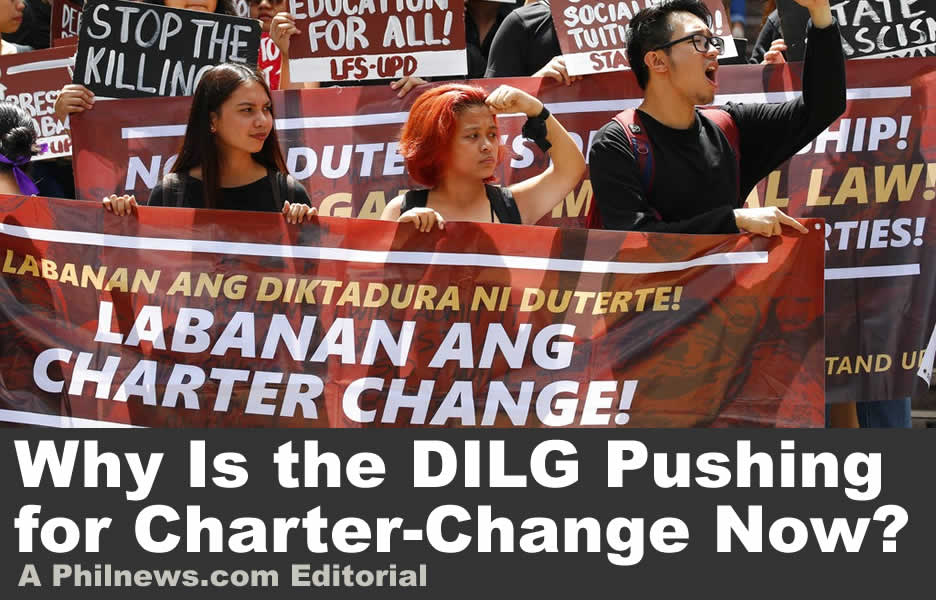 Students protesting charter change in Feb. 2018. Photo: AP/Taiwan News
Students protesting charter change in Feb. 2018. Photo: AP/Taiwan News

ome Filipinos are wondering why the Department of the Interior and Local Government (DILG) is once again promoting its signature campaign for Charter change amid the coronavirus pandemic. Those who question this administration's motives point out that now appears to be the perfect time to change in the country's Constitution. With the entire country in lockdown, distracted by a deadly virus, now might be the ideal time for the government to push through such a change.
A news article by Jeannette Andrade of the Philippine Daily Inquirer noted that amid the COVID-19 pandemic, the DILG "directed its regional offices and supporters to continue gathering up to 2 million signatures over the next two months to back amendments to the Constitution."
Opposition senators Francis Pangilinan and Franklin Drilon, question the push for Charter change (Cha-cha) in the middle of a deadly pandemic. A statement from Pangilinan notes, that "we are hard-pressed to raise funds to address the huge damage caused by the pandemic on the economy ... Charter change should be the least of our concerns today." He suggests that "instead of using government money and personnel on collecting millions of signatures, the DILG should instead focus on mass testing and contact-tracing millions of our citizens."
Also, given the ease with which this deadly virus spreads, the simple process of passing pen and paper between people, to collect millions of signatures could cause the country's infection rate to skyrocket. Instead of bringing the pandemic under control, the signature campaign could instead cause it to spiral out of control.
It is easy to understand why the DILG might see this as an opportune time to promote its Constitutional Reform (CORE) program. With a nationwide lockdown in place and a law giving Malacañang special powers and billions in special funding, there will be significantly less resistance from a distracted population. It would be easier to push the changes through sooner, rather than later when people are less distracted and can study the matter more thoroughly.
The truth is that despite this administration's push for constitutional reform to create a federal form of government, many Filipinos do not support it. A June 2018 survey conducted by Pulse Asia showed 67% of respondents said they were not in favor of a charter change. An important takeaway from this and various other polls is that many Filipinos still feel that a switch to Federalism is unnecessary.
One area that many Filipinos agree on is the need to amend the Constitution to make it more investment-friendly to foreigners. The DILG website itself quotes former Secretary Gary Olivar, stating that "the Philippines is constantly lagging behind our Asian neighbors in attracting foreign direct investment [FDI] in part because of the restrictive provisions of our charter. We should be at the level of Thailand, but we are way behind. If we want to generate enough employment for all, increasing foreign direct investment is the key ... We must make the Philippines competitive, and one of the ways identified by our economic managers is to lift the foreign ownership restrictions in the charter ..."
Like Olivar, most Filipinos seem to favor easing restrictions to foreign ownership. But a more significant attraction for foreign investors might be the country's adherence to the rule of law. Foreign investors want their money in a safe and stable country that adheres to the rule of law.
When investors see companies suddenly targeted or punished by the caprices or misguided impulses of those in power, they stop investing. They know their investments could be targeted next. And if a country's leadership lacks transparency, or stifles the free flow of information, investors will turn around and walk away. There are many investment opportunities elsewhere. In short, well-run countries attract the most investors.
So even if the government foregoes its signature campaign and focuses on virus mitigation, as suggested by Sen. Pangilinan, it can attract foreign direct investment (FDI) by showing the world that it is transparent, trustworthy and that it adheres to the rule of law. Published 5/20/2020
|